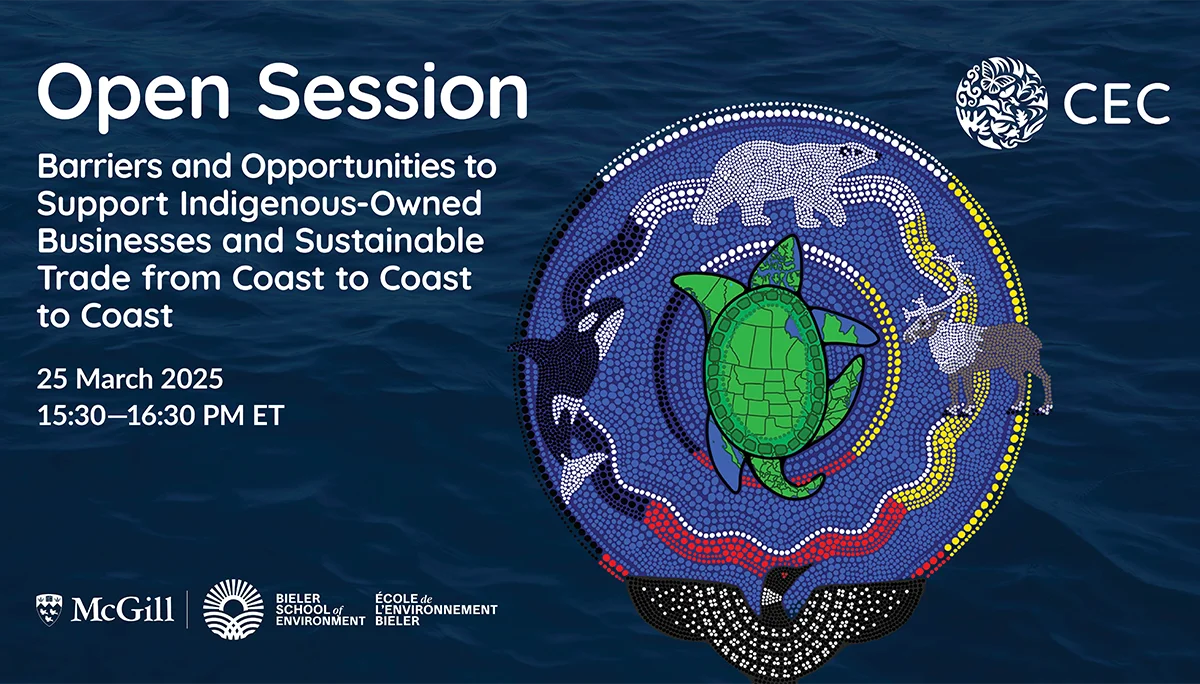On 25 March, join our open session: Barriers and Opportunities to Support Indigenous-Owned Businesses and Sustainable Trade from Coast to Coast to Coast
Join the McGill Bieler School of Environment (BSE) and the Joint Public Advisory Committee (JPAC) of the Commission for Environmental Cooperation (CEC), for an online Open Session, organized in collaboration with the Traditional Ecological Knowledge Expert Group (TEKEG), on supporting Indigenous-owned businesses and sustainable trade across North America!
Hosted as part of the private Roundtable on Sustainable Trade in North America: Indigenous Perspectives, this session—open to the public—will bring together Indigenous business owners, experts, researchers and conservation practitioners from the private and public sectors. Building on two days of roundtable discussions, the event will explore the barriers and opportunities faced by Indigenous-owned businesses across North America, with an emphasis on promoting sustainable trade practices throughout Canada, Mexico and the United States. By engaging in dialogue and sharing insights, participants will focus on identifying future actionable strategies to support the growth of Indigenous businesses and strengthen trade networks rooted in Indigenous values and sustainability.
Online participation in this session is open to the public upon registration and will include a Question and Answer period. We encourage Indigenous business owners, policymakers, trade experts, environmental and economic researchers, private sector representatives, faculty, students and anyone interested in supporting sustainable Indigenous economies to participate.
Date: 25 March 2025
Time: 15:30 PM – 16:30 PM ET
This open session will take place in English, French and Spanish with simultaneous interpretation provided in all three languages.
If you would like to know more about CEC initiatives, opportunities and efforts, you can sign up for our newsletter and follow us on social media.

Image by Angie Saltman (Red River Métis) representing the essence of the Indigenous trade on Turtle Island (North America).
About the CEC
The Commission for Environmental Cooperation (CEC) was established in 1994 by the governments of Canada, Mexico and the United States through the North American Agreement on Environmental Cooperation, a parallel environmental agreement to NAFTA. As of 2020, the CEC is recognized and maintained by the Environmental Cooperation Agreement, in parallel with the new Free Trade Agreement of North America. The CEC brings together a wide range of stakeholders, including the general public, Indigenous people, youth, nongovernmental organizations, academia, and the business sector, to seek solutions to protect North America’s shared environment while supporting sustainable development for the benefit of present and future generations
The CEC is governed and funded equally by the Government of Canada through Environment and Climate Change Canada, the Government of the United States of Mexico through the Secretaría de Medio Ambiente y Recursos Naturales, and the Government of the United States of America through the Environmental Protection Agency.